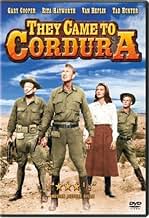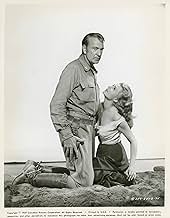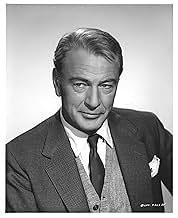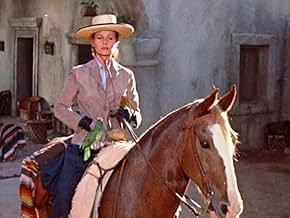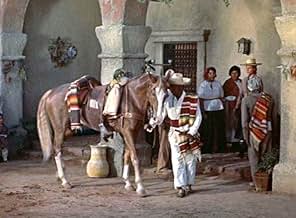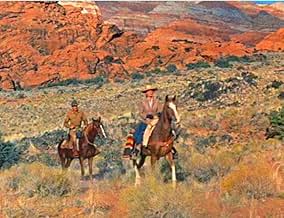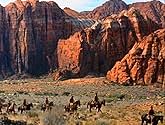IMDb RATING
6.4/10
2.6K
YOUR RATING
An army major, himself guilty of cowardice, is asked to recommend soldiers for the Congressional Medal of Honor during the Mexican Border Incursion of 1916.An army major, himself guilty of cowardice, is asked to recommend soldiers for the Congressional Medal of Honor during the Mexican Border Incursion of 1916.An army major, himself guilty of cowardice, is asked to recommend soldiers for the Congressional Medal of Honor during the Mexican Border Incursion of 1916.
- Director
- Writers
- Stars
- Awards
- 1 win & 1 nomination total
Jim Bannon
- Capt. Paltz
- (as James Bannon)
Wendell Hoyt
- Cavalry Trooper
- (uncredited)
- Director
- Writers
- All cast & crew
- Production, box office & more at IMDbPro
Featured reviews
A really good movie. Ultimately a redemption movie. Heroes can also be villains. A single act of cowardice or an act of courage does not mark the measure or the destiny of a man.
Also, confidence in people can change them and reform them.
The acting is superb throughout, and Gary Cooper captures wonderfully the gradual decline as he leads his motley crew on a trek to survival through the desert. An heroic performance to match the hero he portrays.
This is movie that deserves more acclaim than it has received.
In my book this is a must see. Great fare for Sunday afternoon on the couch!
Also, confidence in people can change them and reform them.
The acting is superb throughout, and Gary Cooper captures wonderfully the gradual decline as he leads his motley crew on a trek to survival through the desert. An heroic performance to match the hero he portrays.
This is movie that deserves more acclaim than it has received.
In my book this is a must see. Great fare for Sunday afternoon on the couch!
I would like to add another comment from a little different viewpoint than what has been expressed at IMDb so far. A little film history first- this movie appeared in 1959 and was based on a book with the same title that had come out about a year earlier. Now, in this era (late 1950s) the Westerns ruled TV as well as the movies. It was the popular genre at the time. Also popular at the time were "war movies" that depicted United States troops in action in WWII. That war was pretty recent in memory then and had been quite popular and, of course, a lot of people still remembered our involvement and victory in the first fracas in 1917-1918. Now, how could an author tie in our military's achievements in the World Wars with the Old West? The World Wars were fought in Europe and Asia (Atlantic and Pacific for you Navy people) and neither had any real connection with the American West. The best that anybody could do to link up the two popular genres was to bring up the expedition in 1916 that sent the Army under General Pershing into the country of Mexico to hunt down or at least slow down the various Mexican rebel factions such as the one under Pancho Villa. This is the one time in history that, by any stretch of the imagination, the modern U.S. military was involved in a part of the "Old West". In this time, the "Old West" still lived in Mexico in 1916 plus the fact the U.S. military still used mounted calvary; though they were not going to take them to Europe the next year. However, the U.S. military did take General Pershing and Capts Douglas McArthur and George Patton to Europe the next year so yes, in a way the WWI (perhaps even the WWII) military did fight in the Old West due to this military expedition. Hence the linkage; and why this time and military action gets a disproportionate amount of attention in movies and TV to this date. The trouble with this premise of the Old West calvary in Mexico is that you have people acting in a way that is simply not believable for that era. The plot is very suspicious. You have five men who find they are going to be submitted for the Medal of Honor- an award that was quite well known even then. Perhaps one or even two of the men might not want the award and could conceivably threaten the nominating officer, but that is highly unlikely. Some men, in the past, have not wanted to be awarded the medal but usually because they sincerely felt they did not perform any action that any other man in their unit would not have done. And even when an individual truly did not want the medal, they never threaten the life of a superior officer. To have five men (one of them an officer) nominated for that most illustrious of medals, gang up on the nominating officer is simply so far fetched that only Hollywood could have even conceived of it. In real life, Captain McArthur was nominated for the medal for his actions in Mexico. He did not receive it due to some political reasons; nevertheless the fact remains that he did not threaten the nominating officer. This, by itself, destroys the entire believability of the character of "Lt William Fowler" in this movie. The rest of the characters are equally unbelievable in the context of the movie- the "act of cowardice" of Maj Thomas Thorn (sorry, but Gary Cooper was just a little too old to portray even a passed over Major) was hardly cowardice but simply proper tactics- take cover until you find out where the enemy fire is coming from. If you can't find it or do not have the proper weapon then stay put. Don't get killed unnecessarily. In fact, the proper response of Maj Thorn to Cpl Milo Trubee, when Trubee threatened to blackmail him, would have been something of the nature of "up yours Trubee" as Trubee hardly had anything to blackmail the Major with. Actually, this movie used the military only because of the high respect in society the military had in the 1950s (and does again today, in fact); hence the more dramatic juxtaposition. Now, having wrote all that- let me explain the true moral of this movie and why I like it so much. The military has high respect in society even though, by and large, the military performs duties that are dirty and hard work. In fact, military duty can be depressingly boring and monotonous. Now, in other parts of society there are people who are doing jobs that are at least equally dirty and hard, boring and monotonous. Unlike the military, those people generally do not get much respect from society. For some reason the upper class (and I am in that group) tends to ignore or turn their backs to the lower class workers. And, then, we wonder why this group of people will act belligerent and tough. Well, they may already be that way. Yet, I have seen decent people turn bad due to the disrespect given to them by others. I do not like to see that occur even though I cannot say that I myself have not been disrespectful in the past to people on the "fringe" of society. This movie, by using military personnel in a proxy manner, explores this deeper issue; basically, are there heroes or at least potential heroes amongst the people that we usually ignore? The thoughtful exploration of that question redeems the error in the movie that I previously mentioned. It is a good movie; I recommend that everybody watch it at least once when they are young as it explores the human psyche in much the same way that Major Thorn does.
On the night of March 18th, 1916, a large mounted force of Mexican rebels under Pancho Villa crossed the American border and attacked the town of Columbus, killing both civilians and soldiers. As a result of this action, the United States Army sent an expedition into Mexico with orders to capture Villa and disperse his forces. It was during this campaign that one man, a United States Army officer, was forced to come face to face with two of the great fundamental questions that affect mankind.
What is courage? What is cowardice? This is the story of his search for an answer.
That summary is the opening text from this oddly {to me} divisive picture from Robert Rossen and Ivan Moffat. Divisive because there are conflicts about it's technical aspects, its length {which cut is original?}, it's talky nature, and if it's splendid cast did the material justice? Well the dispute about the technical aspects being poor certainly don't stand up to the version I saw of the picture, lovely widescreen CinemaScope with Burnett Guffey's photography astutely and rightly oppressive as the story unfolds. As for its length, the version I viewed was two hours long, is this a restored cut or is there still another half hour of Rossen footage lurking somewhere? Either way, the complaint about there being gaps in the film are not evident in this two hour cut. All characters are fully fleshed and every minute of this picture was engrossing and perpetually watchable. The cast are also on fine form, Gary Cooper is perfectly cast as Maj. Thomas Thorn, the man who's moment of weakness hangs heavy round his neck like a curse. Van Heflin, Rita Hayworth, Dick York, Richard Conte and Tab Hunter all help to make this a fine character driven piece.
Above all else it's the story that works the best, Thorn is carrying around a burden as he strives to take these heroes to safety and ensure they receive their medals of honour. But the perilous journey proves to alter each man's attributes, be it despicable or otherwise, something that to me personally makes this a thematically excellent picture, the kind we could do with more of in the modern era. It may well be cynical at times, but really that is no bad thing in my eyes, it's a cop out of sorts I know, but this film isn't for everyone. After a fine battle sequence has been and gone, the film shifts in tone and becomes a picture about the complexities of man and his own personal hang ups, the result of which left me very much rewarded. 8/10
What is courage? What is cowardice? This is the story of his search for an answer.
That summary is the opening text from this oddly {to me} divisive picture from Robert Rossen and Ivan Moffat. Divisive because there are conflicts about it's technical aspects, its length {which cut is original?}, it's talky nature, and if it's splendid cast did the material justice? Well the dispute about the technical aspects being poor certainly don't stand up to the version I saw of the picture, lovely widescreen CinemaScope with Burnett Guffey's photography astutely and rightly oppressive as the story unfolds. As for its length, the version I viewed was two hours long, is this a restored cut or is there still another half hour of Rossen footage lurking somewhere? Either way, the complaint about there being gaps in the film are not evident in this two hour cut. All characters are fully fleshed and every minute of this picture was engrossing and perpetually watchable. The cast are also on fine form, Gary Cooper is perfectly cast as Maj. Thomas Thorn, the man who's moment of weakness hangs heavy round his neck like a curse. Van Heflin, Rita Hayworth, Dick York, Richard Conte and Tab Hunter all help to make this a fine character driven piece.
Above all else it's the story that works the best, Thorn is carrying around a burden as he strives to take these heroes to safety and ensure they receive their medals of honour. But the perilous journey proves to alter each man's attributes, be it despicable or otherwise, something that to me personally makes this a thematically excellent picture, the kind we could do with more of in the modern era. It may well be cynical at times, but really that is no bad thing in my eyes, it's a cop out of sorts I know, but this film isn't for everyone. After a fine battle sequence has been and gone, the film shifts in tone and becomes a picture about the complexities of man and his own personal hang ups, the result of which left me very much rewarded. 8/10
Angered by the US President Wilson's increasing support the rising Mexican political leader General Carranaza, the former US darling Francisco Villa sends his group of rebels to raid a town in New Mexico before coming back over the border. Enraged by the audacity of the man, Wilson orders his troops across the border to catch and/or kill Villa. Part of the group he sends is Major Thomas Thorn, who has been given the job of assessing the men for possible awards a comfortable job given to him by Colonel Rogers, a friend of his father. Fascinated by the nature of heroes, Thorn finds himself given command of a small group of them when he refuses to put Rogers forward for a citation. Thorn is keen to get to know more of the men but, with a captured woman in tow, the men are not as simple as their proposed medals would suggest.
Despite pretty much ignoring the interesting history that serves as a backdrop to this film, this is actually still quite an interesting film that was a lot rawer than I expected it to be, given the period in which it was made. In the early stages it was too basic and I worried that the whole thing would be as clunky as Thorn's early questioning of some of his "heroes", but gradually it got better as it went on and simple lines such as hero and coward were eroded away. This is not to say it is brilliant because it most certainly is not but it is certainly interesting for what it tries to do. It doesn't help that the script really labours the surface but lacks the ability to go significantly deep to really make an impact. However even with this, it was still interesting enough to hold me and I did enjoy the solid if simplistic moral debate that it delivered.
Rossen and his cinematography do great work with the wide-open landscapes but the former must also carry the can for not bringing more emotion out of the script consistently. As a result the cast do well without really excelling with nobody guiding them deeper, this is really what I could have expected. Cooper is as solid as usual with what I suppose was a brave role for him to take. He deals with it well but perhaps wasn't good enough to really convince in layers although he is superficially good enough. Hayworth doesn't have that great a character and her delivery occasionally gets a bit too over-the-top when asked to deliver more emotionally charged material, she has impact but I was looking for more pain and fear. The support cast work well with what they have been given to do. Conte, Heflin, Keith and Hunter are among those giving solid turns in support of Cooper and the raw story.
Overall then this is not a great film but it is an interesting one. Despite being over 45 years old it is surprising raw and willing to turn away from the simple lines of courageous and cowardly towards something that is much realer and well conceived. It doesn't go deep enough but it is strong on the surface could easily have been tighter and dropped 20-30 minutes from the running time but is still worth a look for what it does do well.
Despite pretty much ignoring the interesting history that serves as a backdrop to this film, this is actually still quite an interesting film that was a lot rawer than I expected it to be, given the period in which it was made. In the early stages it was too basic and I worried that the whole thing would be as clunky as Thorn's early questioning of some of his "heroes", but gradually it got better as it went on and simple lines such as hero and coward were eroded away. This is not to say it is brilliant because it most certainly is not but it is certainly interesting for what it tries to do. It doesn't help that the script really labours the surface but lacks the ability to go significantly deep to really make an impact. However even with this, it was still interesting enough to hold me and I did enjoy the solid if simplistic moral debate that it delivered.
Rossen and his cinematography do great work with the wide-open landscapes but the former must also carry the can for not bringing more emotion out of the script consistently. As a result the cast do well without really excelling with nobody guiding them deeper, this is really what I could have expected. Cooper is as solid as usual with what I suppose was a brave role for him to take. He deals with it well but perhaps wasn't good enough to really convince in layers although he is superficially good enough. Hayworth doesn't have that great a character and her delivery occasionally gets a bit too over-the-top when asked to deliver more emotionally charged material, she has impact but I was looking for more pain and fear. The support cast work well with what they have been given to do. Conte, Heflin, Keith and Hunter are among those giving solid turns in support of Cooper and the raw story.
Overall then this is not a great film but it is an interesting one. Despite being over 45 years old it is surprising raw and willing to turn away from the simple lines of courageous and cowardly towards something that is much realer and well conceived. It doesn't go deep enough but it is strong on the surface could easily have been tighter and dropped 20-30 minutes from the running time but is still worth a look for what it does do well.
The Pancho Villa Expedition—officially known in the United States as the Mexican Expedition and sometimes colloquially referred to as the Punitive Expedition—was a military operation conducted by the United States Army against the paramilitary forces of Mexican revolutionary Francisco "Pancho" Villa from 1916 to 1917 during the Mexican Revolution. The expedition was launched in retaliation for Villa's attack on the town of Columbus, New Mexico, and was the most remembered event of the Border War. The expeditions had one objective: to capture Villa dead or alive and put a stop to any future forays by his paramilitary forces on American soil.
After contact with the enemy, and after losing many men, five men were nominated for the Medal of Honor. Since the army needed living heroes to prepare the nation for its likely entry into WWI, Major Thomas Thorn (Gary Cooper), an awards officer, escorts the nominees, Lt. William Fowler (Tab Hunter), Sgt. John Chawk (Van Heflin), Cpl. Milo Trubee (Richard Conte), Pvt. Andrew Hetherington (Michael Callan), and Pvt. Renziehausen (Dick York), back to headquarters. This film is the story of that journey, and Thorn's exploration of the character of heroes.
Adelaide Geary (Rita Hayworth), an American woman who owns the ranch where the battle was fought, is sent back with them on charge of treason for aiding Villistas against American soldiers, even though she had no choice.
Although Hayworth and Cooper both gave impressive performances, Van Heflin was the standout as a brutish sergeant, especially since he was acting against type, having played decent men forced into heroism during his best-known films, Shane (1953) and 3:10 to Yuma (1957).
After contact with the enemy, and after losing many men, five men were nominated for the Medal of Honor. Since the army needed living heroes to prepare the nation for its likely entry into WWI, Major Thomas Thorn (Gary Cooper), an awards officer, escorts the nominees, Lt. William Fowler (Tab Hunter), Sgt. John Chawk (Van Heflin), Cpl. Milo Trubee (Richard Conte), Pvt. Andrew Hetherington (Michael Callan), and Pvt. Renziehausen (Dick York), back to headquarters. This film is the story of that journey, and Thorn's exploration of the character of heroes.
Adelaide Geary (Rita Hayworth), an American woman who owns the ranch where the battle was fought, is sent back with them on charge of treason for aiding Villistas against American soldiers, even though she had no choice.
Although Hayworth and Cooper both gave impressive performances, Van Heflin was the standout as a brutish sergeant, especially since he was acting against type, having played decent men forced into heroism during his best-known films, Shane (1953) and 3:10 to Yuma (1957).
Did you know
- TriviaAlthough Gary Cooper was 57, his character Major Thorn was forty years old according to the novel. Early in the film it is mentioned that Thorn's father had recently been killed while still on active service.
- GoofsMajor Thorn improperly salutes Colonel DeRose in the opening scene when he is dismissed. He should have saluted and held his salute until it was acknowledged. Instead, he lowers his arm even before Colonel Rose acknowledges it.
- Quotes
Major Thomas Thorn: Did you ever see the Medal of Honor?
Private Renziehausen: No, Sir.
Major Thomas Thorn: It's the most beautiful decoration of all, as it should be. I'd trade an ear for one any time, two in fact.
Private Renziehausen: Excuse me, Sir, but I'd rather have the ear.
- Crazy creditsOpening credits prologue:
On the night of March 8th, 1916, a large mounted force of Mexican rebels under Pancho Villa crossed the American Border and attacked the town of Columbus, New Mexico, killing and wounding both American civilians and soldiers.
As a result of this action,the United States Army sent an expedition into Mexico with orders to capture Villa and disperse his forces.
It was during this campaign that one man, an United States Army officer,was forced to come face to face with two of the great fundamental questions that affect mankind:
What Is Courage? What Is Cowardice?
This is the story of his search for an answer.
- ConnectionsFeatured in Stars of the Silver Screen: Rita Hayworth (2011)
- How long is They Came to Cordura?Powered by Alexa
Details
Box office
- Budget
- $4,000,000 (estimated)
- Runtime
- 2h 3m(123 min)
- Color
- Aspect ratio
- 2.35 : 1
Contribute to this page
Suggest an edit or add missing content



